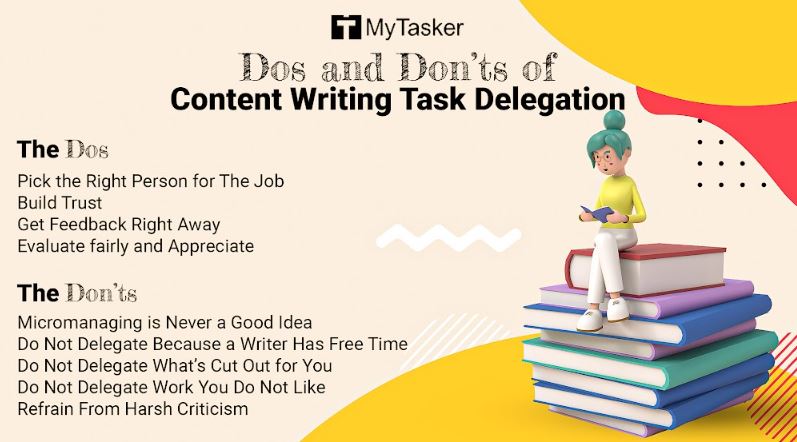Okay, so ‘delegation’ is one of those many entrepreneur catchwords that has either managed to help a person operate systematically or mess up the entire workflow. For people who have been there and eventually mastered this mindful art, delegation works wonders. However, people who are yet to give it a shot are often terrified of its outcome.
As a content writer, I am ambivalent about the concept of task delegation. While delegating the right task to the right person can save time and help manage the day’s work with ease, a wrong decision can lead to a complete waste of time, resources, and energy. In her book Management Skills for New Managers, author Carol Ellis states, “Managers who delegate effectively have direct reports who are more capable and enthusiastic because of the delegation experience. A good manager knows that delegation is the way to achieve results through others.” In fact, delegating content writing tasks effectively can boost the morale and enthusiasm of a writer to a great extent.
That said, delegation is not a skill that comes naturally to everyone. While some are afraid to lose control of certain tasks, some might be worried about employees resenting delegation. To delegate effectively, you need to be aware of the dos and don’ts of content writing task delegation.
On that note, let’s take a quick look at our list.
The Dos
-
Pick the Right Person for The Job

Before you delegate a content writing task, evaluate the writers in your team who might perform it efficiently. Sometimes, having a great command over the language is not enough to offer the desired results for a task. Now, choosing the right person for the job primarily depends on two factors – capacity and skill. In case the writer lacks the necessary skills, dedicate some time towards training them. However, if they lack capacity or the ability to do justice to the task within a stipulated time frame, you might try considering someone else.
-
Build Trust

Delegating any task requires you to have faith and trust the person at the other end. When you delegate a content task to another writer, you have to trust them with your authority. Subsequently, you have to trust your seniors to be sympathetic when your writers make mistakes. As they say, trust is not built overnight. So, you can start by delegating smaller tasks with no significant repercussions. As the writer attains success with these, you can move on to delegating more significant tasks down the line.
-
Get Feedback Right Away

Effective delegation is always backed by great communication. Ensure that the writer you delegate a task to clears their understanding right away. Both of you must be on the same page. Like James Bono, Associate Dean of the College of Pharmacy, University of Illinois, states, “You are never as clear as you think you are.” Clarify all miscommunications and be clear about the result you expect, the quality of content, and most importantly, the deadlines.
-
Evaluate fairly and Appreciate

Make sure that you evaluate a writer’s work based on the requirements and guidelines mentioned in the concerned task. Please do not go out of your way to burden any last-minute expectations on them or force a writer to perform a task in a manner you would. Intruding one’s creative space is never a good idea when it comes to content writing. Provide honest feedback if their work fails to meet a certain standard and subsequently reward them if they perform well. Lastly, a ‘thank you’ at the end can work magic on the writer’s psyche.
The Don’ts
-
Micromanaging is Never a Good Idea

The main purpose of delegating a writing task is to no longer deal with it yourself. Even if you have assigned a certain task as a training opportunity for your writer, make sure you give them enough space to start learning on their own. Micromanaging every aspect of a task might undermine the confidence of a writer. Let your writers know that you trust them by staying away from the task until it’s time for evaluation.
-
Do Not Delegate Because a Writer Has Free Time

More than often, a writer’s ability to get the task done and potential is overlooked due to the time factor. Do not delegate a task because you feel the writer has lesser tasks than you do or has ample time in hand. Balance out all the required criteria and assign the task to the one best suited to execute it.
-
Do Not Delegate What’s Cut Out for You
Yes, it does feel great to delegate your tasks. However, every content writing task is not supposed to get delegated or outsourced. A few tasks are assigned to you because they need your insight and expertise alone. Be careful about what you delegate and retain vital tasks in your to-do list.
-
Do Not Delegate Work You Do Not Like

Now, let’s be honest. No one likes working for a senior who delegates to evade unpleasant tasks. To a great extent, good leadership is about agreeing to perform aggravating, unappealing, and menial tasks. Do not pass off a task because you hate it. It is poor management and will result in your team losing respect for you.
-
Refrain From Harsh Criticism
Indulge in constructive criticism as opposed to unconstructive ones. Try to be involved and encouraging when you provide feedback to your writer. Frame it positively without belittling the person. This will encourage and enable the writer to learn and improve.
Delegating content writing tasks can often be similar to walking on thin glass. One wrong choice and your entire project can get derailed. Having said that, it is a great idea to delegate tasks at times and share some of the responsibilities. Remember, delegation should not be embarrassing, forced, or micromanaged. It must be motivating, encouraging, and one that bears possibilities of future growth as a writer.















